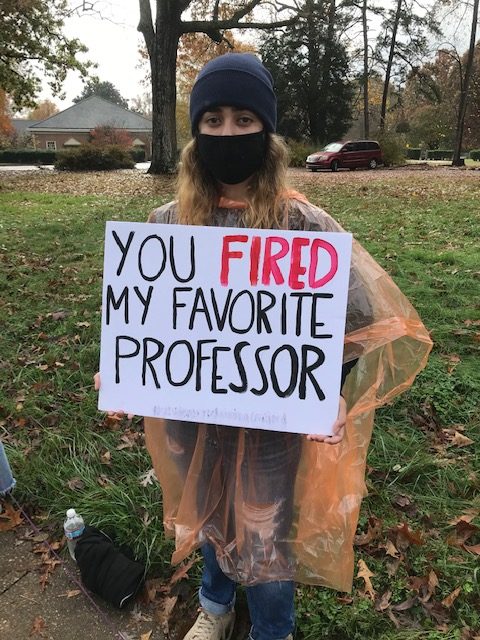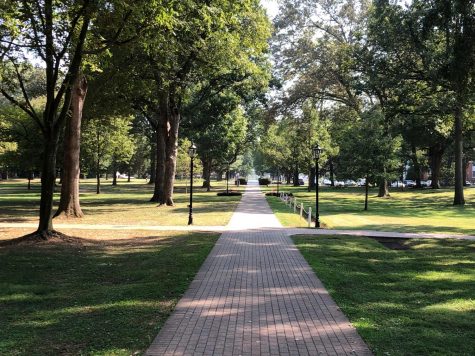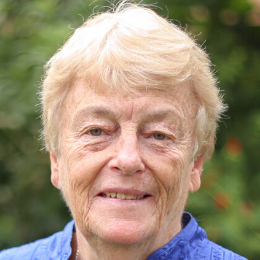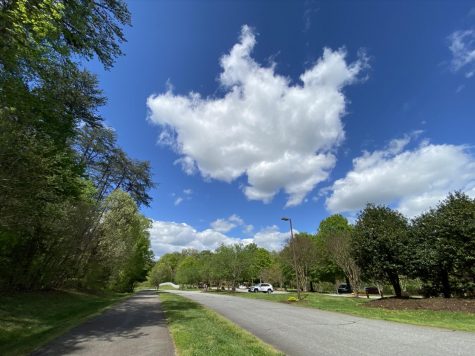Students protest program and staff cuts
In the week after the Town Hall meeting where Interim President Carol Moore announced recommended program cuts under the proposed program prioritization, Guilford students have protested on and around the campus. Through these protests, students have voiced their discontent with the program cuts and mass firings recommended by Moore and the Board of Trustees.
The first of these protests was on Wednesday, Nov. 11, from 12:30-3 p.m. on New Garden Road across the street from Guilford, near the admissions parking lot. Ponchos, umbrellas, water, signs and food were all provided for attendees.
Students stood in a socially distanced line on the sidewalk holding signs with phrases written on them such as “trustees cannot be trusted,” “answer the question Carol,” “save my major,” “you fired my favorite professor,” “the tree is dying,” “I am very peeved,” “our voices should matter” and “no firing before filing.” The protesting students also chanted to the beat of a snare drum: “We have no trust in the board of trustees,” “Justice! When do we want it? Now!” and “No integrity, no tuition, no transparency, screw the system.”
Guilford junior and organizer Haydyn Foulke took a lead role in planning this protest. She was there holding signs, leading chants and helping to get new people who showed up involved.
“There were always about 15 people there, but we had at least 35-40 people trickle in and out throughout the several hours,” Foulke said. “There were alumni and current students. There were kids of the alumni dancing to the drums and cheering to save Guilford. The vibe was energetic, hopeful and filled with righteous anger.”
Foulke is a community and justice studies major, a program which is on the list of those recommended for phasing out. Her mentor has been fired and programs which she has been a part of for years, like the Center for Principled Problem Solving and the Bonner Center, are being defunded. She has been a leading student voice in speaking out against what she believes is a slashing of the liberal arts education that Guilford is known for providing.
“Our community has been gutted, and we will not stop fighting until the Board of Trustees upholds the values of equity, diversity, justice and stewardship that drew us here,” Foulke said. “No actual students were consulted in this decision… The major cuts were senseless, arbitrary and a deep blow to our robust liberal arts education. ‘Program prioritization’ is threatening the integrity and value of my education.”
It is clear that students’ efforts are making an impact and gaining media attention. A reporter from Fox News 8 was filming the Nov. 11 protest and pulled several students aside for on-camera interviews. Prospective students were touring Guilford campus on this day as well, and many drove past the protest on their way to the admissions building.
This action not only gained the attention and participation of current Guilford students, but of alumni as well.
Hali Rose Kohls, Guilford ’15, was in attendance as well. As a student, she was a double major in sociology and anthropology and women’s gender and sexuality studies. The Sociology and Anthropology Department is on the list of recommended cuts.
“I arrived at 12:30 when the first few people were showing up,” Kohls said. “Organizers explained the plan, why we had to stay on the sidewalk opposite campus, who to refer outside media people to, what to do if P-safe shows up, what our goals were, etc… They passed out signs, which I chose carefully to be sure I agreed with what was written on it. Snacks and water were passed out. People were often reminded to keep a safe six-foot distance as more protestors joined.”
Kohls spoke about what alumni are experiencing during this tumultuous time at Guilford.
“My alumni friends are all distraught and confused,” Kohls said. “We are trying to find ways to connect with administrators to figure out why these specific recommendations were made and what other solutions may be out there. If I were still a student I would definitely be looking at other schools—sadly and pessimistically. I visited 36 colleges and universities, some of them twice, including Guilford College, before deciding to attend Guilford. There’s very few schools like it.”
Though she doesn’t necessarily believe that the Board of Trustees should be disbanded or replaced, she believes the community needs to band together to work through the College’s financial crisis and do more than just dismantle the administration.
“I wanted to make my voice heard as a passionate alumna who believes in the transformative education that Guilford College has to offer,” Kohls said. “While I was proud to be part of a student-led demonstration and I find protests valuable, I think it is going to require a lot more understanding, transparency and dialogue for the ‘Save Guilford’ group to work with the administration to ensure the Guilford ethos is upheld.
“I hope we can find a way to communicate effectively and successfully with the administration,” Kohls continued. “We cannot let this be one of those times students, alumni, faculty and staff voices are ignored and we lose the integrity of our Quaker values and the Guilford College mission.”
This was not the first protest which students attempted to organize. Several other protests had been in the works for Nov. 11, but they were disbanded in favor of the one that took place across from Guilford’s campus. These decisions were made in light of the Guilford protest policy, which requires students to get approval from Public Safety before assembling, and an email sent the night before from the Guilford Student Body Association (GSBA) executive board. The email was titled “Official Statement Concerning Potential Actions in Response to Program Prioritization.”
Sent from the Division of Student Affairs account on Nov. 10, the email addressed actions that were going to be taken by students in response to program prioritization: “We cannot and will not condone the promotion of activities that may result in a student being removed from the school, a student being fined, or a student being arrested, among other consequences. We find the promotion of such things to be dangerous and unconscionable and we urge this conglomeration of organizers to cease and desist in all planning and execution of potentially harmful forms of protests… This is not to act as a request to discontinue any and all forms of protesting, but may it serve as a reminder that there are proper channels in which these protests must travel through in order to avoid repercussions.”
The protest across from campus which students organizers planned was peaceful and socially distant, and did not include any activities which may have been harmful to students or led to their arrest.
A few days after this email, on Nov. 12, GSBA sent a follow-up email about a silent protest they were organizing with Guilford In The Know to “give all students a voice… in a space where no one is in danger of long-term consequences.”
This protest took place on Nov. 13, 12- 3 p.m. on the Guilford quad. A link was sent for interested students to sign up beforehand, and a meeting was held before the protest, at 11:30, so that goals, policies and precautions could be discussed. Materials for sign-making were provided to participants upon arrival and protestors were given chairs spaced six feet apart on the brick path that leads to Founders Hall.
Guilford junior and sustainable food systems major Caroline Sprenger was one of the students who joined the protest.
“I wanted to come to show my support to the folks who are angry about what’s happening at Guilford,” Sprenger said. “I think Guilford has a long history of student activism, and the students here really care about the fate of the school… There’s a lot of direct action organizing going on and a lot of passionate students who are fighting to ensure that this school maintains a sense of its values.
“Almost every humanities major is being cut, so this is a gutting of the liberal arts education,” Sprenger continued. “We need to break down this narrative that these decisions are only being made based on the amount of students enrolled in each program. That’s not true.”
Some students, including Foulke, are so upset about the changes being made at Guilford that they are considering transferring.
Sprenger, along with other students at the Nov. 13 protest, said that students need to take urgent action, and need to be sure their voices are heard before the appeals process for programs is over and final decisions are made.
“We have a few months to really organize, put pressure on the Board of Trustees and Carol Moore, make student voices heard and to show everyone that no matter what happens, students are not going to take this lying down,” Sprenger said.
Students looking to join further actions and get involved in protesting program and staff cuts can follow @nathanhunt1837, @studentsreclaimingguilford and @saveguilford on Instagram, or join the Students for Ethical Leadership email list.









